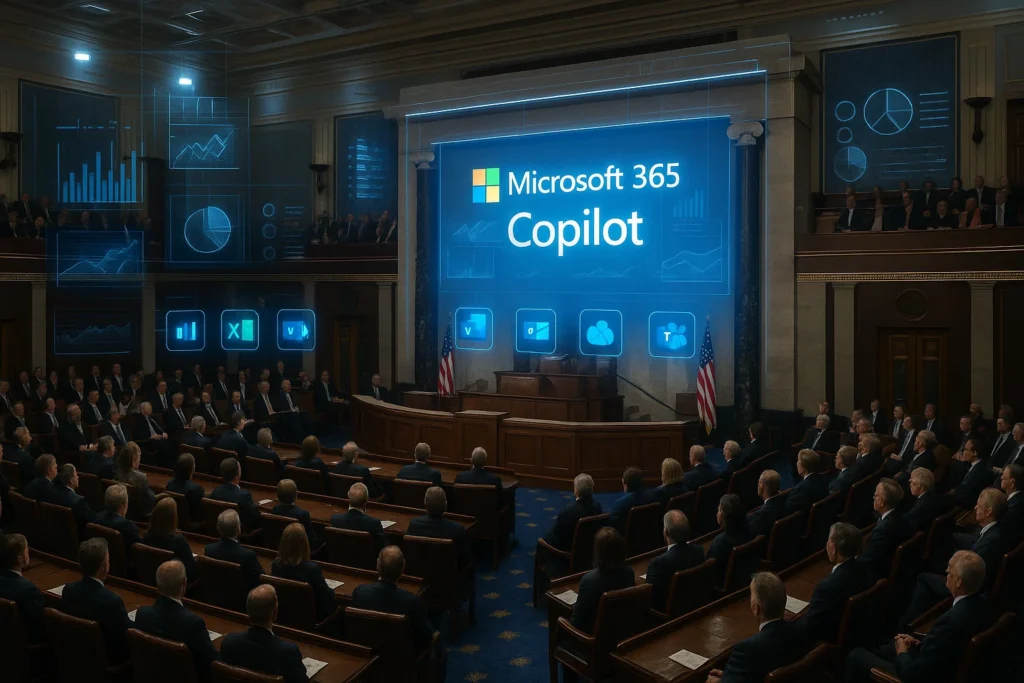The U.S. Congress adopts Microsoft 365 Copilot—explore how AI is transforming government work, policy-making, and public trust.
Microsoft 365 Copilot in U.S. Congress: A Shift in Government AI Adoption
Artificial intelligence is no longer just a buzzword in Silicon Valley boardrooms—it is now making its way into the very heart of American governance. In a landmark move, the U.S. Congress has begun adopting Microsoft 365 Copilot, an AI-powered productivity assistant integrated within Word, Excel, Outlook, and Teams. This represents not just a technological upgrade but a historic shift in how government institutions embrace AI for decision-making, legislative processes, and public service.
This article explores what Microsoft 365 Copilot means for lawmakers, staffers, and citizens, while addressing the opportunities, risks, and broader implications for U.S. democracy and global AI governance.
1. Why Congress Turned to Microsoft 365 Copilot
Government institutions are notorious for slow adaptation to new technologies. From outdated fax machines to legacy filing systems, modernization has often lagged behind private industry. Yet the decision to integrate Copilot reflects urgent realities:
- Efficiency Demands: Lawmakers and staff manage thousands of bills, reports, and constituent communications. Copilot promises to speed up drafting, summarizing, and analyzing text-heavy documents.
- Digital Transformation Push: As agencies transition to cloud-first strategies, AI integration aligns with modernization mandates set by the Biden administration’s federal IT initiatives.
- AI Competitiveness: The U.S. government is signaling leadership in AI adoption, countering fears of falling behind China and the European Union in setting global standards.
Congress, often criticized for being behind the curve, may finally be leading by example.
2. What Microsoft 365 Copilot Actually Does in Congress
Microsoft 365 Copilot is not a chatbot in the traditional sense. Instead, it’s an AI layer embedded within Microsoft’s suite of productivity tools already used by congressional offices. Here’s how it could reshape day-to-day operations:
- Bill Drafting Assistance: Staffers can generate initial drafts of legislation, resolutions, or speeches, significantly reducing turnaround time.
- Summarization: Copilot can analyze hundreds of pages of reports and provide concise summaries, helping lawmakers grasp key details quickly.
- Email & Constituent Response Automation: Drafting replies to citizens’ inquiries becomes faster while maintaining personalized language.
- Policy Analysis in Excel: By processing large datasets, Copilot helps staff interpret economic, healthcare, and defense statistics more effectively.
- Collaboration in Teams: Meeting notes, action items, and policy brainstorming sessions can be transcribed and structured in real time.
Essentially, Copilot functions as a digital legislative aide, amplifying productivity across the board.
3. The Symbolism of AI in Congress
The symbolism of Congress adopting Copilot cannot be overstated. This move is more than a productivity upgrade—it represents a cultural and political milestone:
- Government Endorsement of AI: By integrating AI into its own work, Congress sends a message of trust and confidence in AI tools.
- Public Legitimization: Citizens skeptical about AI may view its adoption by the government as validation of its safety and utility.
- Policy Precedent: This action lays the groundwork for wider AI use across federal agencies, from the Pentagon to the Department of Education.
For many, it feels like the government is finally stepping into the 21st century.
4. Benefits of Copilot for Lawmakers and Citizens
The potential upside is enormous if Copilot is used responsibly:
a) Increased Legislative Efficiency
Congress often faces gridlock, but at least the drafting and research processes can be accelerated. Faster document preparation could allow lawmakers to spend more time on actual debate and policymaking.
b) Better Public Communication
With AI managing constituent emails, offices can respond quicker and more consistently to the millions of inquiries received each year.
c) Data-Driven Policy
Copilot’s integration with Excel and Power BI could transform how lawmakers interpret economic forecasts, healthcare outcomes, and national security data.
d) Reduced Administrative Burden
Staffers, often overworked, can reallocate their time from repetitive tasks to higher-value legislative work.
e) Transparency in Governance
If AI-generated summaries are made public, citizens might gain clearer access to complex reports and legislative documents.
5. Risks and Concerns Around AI in Congress
No AI deployment comes without risks, and Copilot in Congress raises serious ethical, legal, and democratic concerns.
a) Accuracy and Hallucinations
Like all AI, Copilot can generate errors or “hallucinate” false facts. In legislation, even small inaccuracies can have major consequences.
b) Confidentiality and Security Risks
Congress handles sensitive information. Storing prompts and outputs on cloud-based AI systems introduces cybersecurity vulnerabilities, even with Microsoft’s security assurances.
c) Bias in AI Outputs
Copilot’s training data may reflect political, cultural, or racial biases. This could unintentionally skew legislative language or summaries.
d) Reduced Human Oversight
Delegating too much responsibility to AI risks lawmakers relying less on human judgment and more on algorithmic outputs.
e) Public Trust Issues
Skeptics may view Congress’s use of AI as detachment from authentic, human-driven governance. This perception could deepen polarization.
6. The Legal & Regulatory Context
Ironically, while Congress experiments with AI, it has yet to pass comprehensive legislation on AI governance. Key points include:
- AI Executive Order (2023): President Biden mandated transparency, safety, and fairness in AI systems, but implementation is ongoing.
- Pending AI Bills: Lawmakers are considering multiple bills on AI transparency, copyright, and data privacy.
- European Union Benchmark: The EU AI Act, adopted in 2024, serves as a regulatory model. The U.S. risks falling behind if Congress doesn’t act swiftly.
By adopting Copilot, Congress may find itself both a user and regulator of AI—an unusual dual role.
7. The Role of Microsoft in U.S. Government AI
Microsoft’s deep ties with the U.S. government are expanding. Beyond Office tools, Microsoft provides cloud infrastructure (Azure Government Cloud) and cybersecurity services. With Copilot, it cements itself as a primary AI vendor for Washington.
Critics argue this could create vendor lock-in where government functions become too dependent on a single tech giant. Others see it as a strategic partnership that ensures consistent standards and reliability.
Either way, Microsoft’s role is now central to the government’s digital transformation journey.
8. Global Implications of Congress Using AI
The world is watching. If the U.S. Congress successfully implements Copilot, it could inspire other democracies to follow suit. Potential ripple effects include:
- Democratic Innovation: Governments in Europe, Canada, and Asia may adopt AI tools for legislative efficiency.
- Geopolitical AI Race: China’s centralized government AI strategies contrast with the U.S.’s democratic adoption model.
- Standard-Setting Power: By using Copilot, Congress can influence what “responsible AI governance” looks like worldwide.
This move positions the United States not only as a consumer of AI but as a trendsetter in governmental AI adoption.
9. How Citizens May Experience This Shift
For the average American, Congress using Copilot could feel distant, but its effects may trickle down quickly:
- Faster Response Times when contacting representatives.
- Simplified Public Reports that are more digestible to non-experts.
- AI-Influenced Policy Outcomes, from healthcare reform to defense budgets.
Yet concerns remain: Will AI-driven communication feel impersonal? Will the public know when they’re interacting with AI rather than a staffer? These are key questions for democratic transparency.
10. Expert Opinions
AI researchers, policymakers, and ethicists are split on Congress’s Copilot adoption.
- Proponents highlight efficiency gains, modernization, and stronger U.S. leadership in AI.
- Critics warn about overreliance, security risks, and loss of public trust.
Think tanks like the Brookings Institution argue that Congress should accompany AI adoption with strict oversight frameworks to safeguard against unintended consequences.
11. Roadmap Ahead: What Comes Next
The integration of Microsoft 365 Copilot in Congress is likely just the beginning. Next steps may include:
- Expansion Across Federal Agencies: The Department of Defense, State Department, and IRS may adopt similar AI assistants.
- AI Governance Legislation: Congress may pass laws mandating transparency and guardrails for government AI usage.
- Public-Facing AI Tools: Citizens could gain access to AI-generated bill summaries or dashboards explaining government decisions.
- Continuous Oversight: Committees may be formed specifically to monitor AI performance, ethics, and security in government contexts.
The future of U.S. governance may increasingly depend on how well AI and human decision-making can work together.
12. Historical Perspective: From Typewriters to Copilot
Congress’s adoption of Copilot echoes earlier shifts:
- Typewriters in the 20th Century sped up legislative drafting.
- Email in the 1990s transformed constituent communication.
- Cloud Platforms in the 2010s improved collaboration.
Now, AI represents the next step in a long journey of technological modernization within government institutions.
Conclusion: A New Era of AI-Driven Governance
The U.S. Congress adopting Microsoft 365 Copilot marks a pivotal moment in government AI adoption. It signals not only modernization but also a willingness to experiment with cutting-edge technologies in the public sphere.
The potential benefits—faster legislative drafting, clearer public communication, and data-driven decision-making—are profound. Yet the risks—bias, overreliance, and security vulnerabilities—cannot be ignored.
For democracy to thrive in the AI era, lawmakers must embrace Copilot as a tool, not a replacement for human judgment. Transparency, oversight, and accountability will be essential to ensure that citizens trust AI-augmented governance.
If handled responsibly, this step could usher in a new era where government institutions become more efficient, transparent, and accessible. If mishandled, it risks deepening public mistrust and technological dependency.
The world is watching as Congress tests this experiment in AI governance. Whether it becomes a model for innovation or a cautionary tale will depend on choices made in the coming months.

